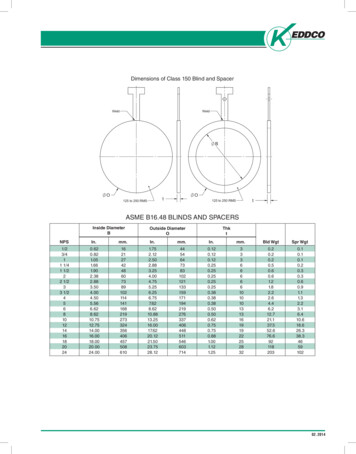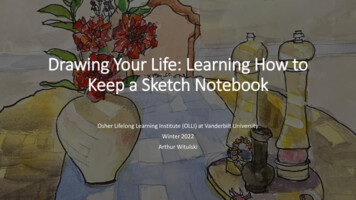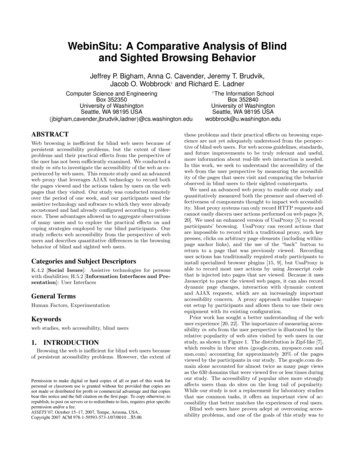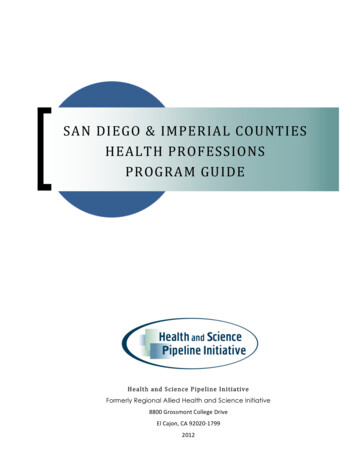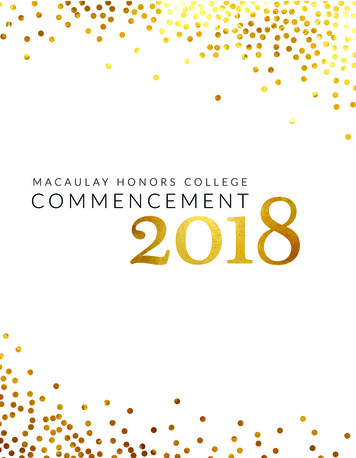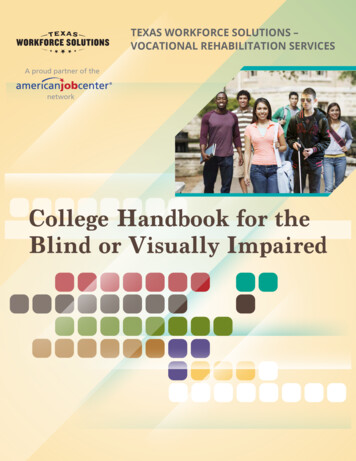
Transcription
TEXAS WORKFORCE SOLUTIONS –VOCATIONAL REHABILITATION SERVICESCollege Handbook for theBlind or Visually Impaired
For more information:800-628-5115www.twc.texas.gov
ContentsGetting Started. 2College preparation training. 4College preparation checklist. 5Ongoing Student Responsibilities. 7Free Application for Federal StudentAid and grants. 9Course registration. 12Course drops and withdrawals. 13Texas state law on course dropand withdrawal limit. 14Services. 16Tuition. 16Certificate of blindness tuition waiver. 16Other tuition services. 17Books and supplies. 17Services for academic training. 18Reader services. 18Low-vision services. 20Assistive technology and training. 20
Services for independent livingand transportation. 21Vocational rehabilitation. 21Orientation and mobility training. 22Diabetes education. 23Transportation. 23Comparable Services and Benefits. 24Comparable benefits from college. 25Disability Services Office. 25Resources. 27Academic training and independent living. 27Career exploration and internships. 29Adaptive aids and providers. 31Scholarships. 32Support organizations and groups. 32Notes. 33
Texas Workforce Solutions is comprised of the Texas WorkforceCommission, 28 local workforce development boards and ourservice-providing partners. Together we provide workforce,education, training and support services, including vocationalrehabilitation assistance for the people of Texas.Texas Workforce Solutions-Vocational RehabilitationServices (TWS-VRS) has prepared this handbook to providebasic information about college services and resources tohelp people who are blind or visually impaired attendcollege and achieve their academic goals.Earning a college degree is a rewarding task, but it requiresfocus, motivation and accountability. Students must committo hard work and dedicate time to studying. Counselorsare available to help students; however, it is the student’sresponsibility to seek, obtain and maintain any resourcesneeded to face challenges during the academic journey.A successful college experience can prepare blind and visuallyimpaired people for the job market and for meeting futureemployers’ expectations.This handbook will provide prospective students with agreater understanding of: Their responsibilities as a student receiving college servicesfrom TWS-VRS Their responsibilities under Texas law. Services they may be eligible for through TWS-VRS. Comparable benefits and services available from collegesand other sources.At any time, students may contact their VR counselor withquestions.College Handbook1
Getting StartedAnyone eligible for educational services from TWS-VRS willbe assigned a TWS-VRS counselor to start the process ofattending college. The TWS-VRS counselor assists potentialstudents by determining their educational needs based onthe academic requirements associated with employment intheir chosen career field.The TWS-VRS counselor will also consider the student’srecord of academic achievement and independent livingskills when deciding whether to grant assistance foreducational training.BACHELOR’S DEGREE - please see policy C-214 for additional guidanceAnyone seeking support for a bachelor’s degree should provide: High school transcript,General EquivalencyDiploma (GED) or otherrecord of academicachievement Free Application forFederal Student Aid(FAFSA) award letter(see policy C-411) College transcripts, if any Copy of grade reports& schedule if currentlyenrolled Acceptance or admissionsletter to college2Texas Workforce Commission Copy of the degree plan
The student submits the required documentation, it may beused as a part of the TWS-VRS comprehensive process.Assessments help provide a complete picture of thestudent’s current capabilities and needs in all areas thatmay affect the college experience.Possible assessments: Vocational Psychological /Comprehensive VocationalEvaluation System (CVES) Low vision Physical Skills assessment by aVocational RehabilitationTeacher Orientation and mobility Employment AssistanceServices (EAS) consultation Assistive technologyOther assessments not included in this list may also berecommended. When TWS-VRS has reviewed all transcriptsand confirmed that all necessary assessments are complete,the TWS-VRS counselor and the student will meet to discussassessment-based recommendations, develop a vocationalgoal and create an Individualized Plan for Employment (IPE).The IPE, which includes the student’s educational plans, isbased on skills, capabilities, interests and informed choices.College Handbook3
POSTGRADUATE DEGREEFor support beyond a bachelor’s degree, the TWS-VRSsupervisor may be consulted by the counselor who willapprove or deny support based on previous academicsuccess, acceptance to a graduate (or other) program andif the degree is required for employment in the chosencareer field.College preparation trainingTWS-VRS may refer students to the Criss Cole RehabilitationCenter (CCRC) to participate in the College PreparationTraining program. This program is offered once a year inthe summer and prepares high school students who areblind or visually impaired for college through field trips tolocal campuses and training in core skills needed to succeedin college, such as self-advocacy, time management, studymethods and note taking.4Texas Workforce Commission
College preparation checklistTo receive services from TWS-VRS, students must: Complete all activitiesand assessments requiredby TWS-VRS beforebeginning college withTWS-VRS assistance. Apply for federal financialaid (FAFSA). Have a current IPE. Be available and participatein required assessments.The items included in the checklistreflect TWS-VRS policy (C-411-1) oncollege services. For moreinformation about this policy, askyour counselor for a copy of thepolicy or assistance.Several spaces have been providedin the checklist for otherassessments, as identified on theIPE, that the student may berequired to complete. Studentshould defer to the list ofrequirements provided by theirTWS-VRS counselor.College Handbook5
COLLEGE PREPARATIONCUSTOMER NAME:CHECK LISTSCHEDULEDDOCUMENTATION REQUIRED (Policy C-411-1)Course registration for eachsemester or quarterHigh school transcript or GED /record of academic achievementFree Application for Federal Student Aid(FASFA) award letterCopy of the degree planDATE COMPLETED//////////VocationalPsychologicalLow visionVision VRTVRT college checklistOrientation and mobilityEAS consultationAssistive OTHEROther examples of assessments may include: CrissCole Rehabilitation Center tour Postsecondary/exitprogram TSBVI tour//Books and supplies list before the start of thesemester or quarterADDITIONAL ASSESSMENTS6Texas Workforce Commission
Ongoing Student ResponsibilitiesStudents must maintain regular contact with their TWS-VRScounselors to assess progress and update the student’s IPEto reflect any changes to educational or professional goalsand services. In addition, counselors can provide guidanceregarding services, accommodations and other issuesrelated to academic success.Students should meet with their VR counselors, as outlinedin the IPE, to review GPA and progress each semester. Theywill also review the IPE at least annually to review overallprogress of the IPE. In addition, students must inform theirTWS-VRS counselor regarding any changes to address,telephone number, income, vocational goal or degree plan,including dropped classes or changes to academic schedule.Ongoing student responsibilities (Policy C-411-2): Enroll in courses relatedto their declared major Maintain any equipmentprovided by TWS-VRS Maintain a full-timecourse load each semester Maintain regularcommunication withtheir TWS-VRS counselorand college staffmembers involved withthe IPE Maintain satisfactorytraining progressCollege Handbook7
ON-GOINGDOCUMENTATION REQUIREDSEMESTERSCHEDULEDCOMPLETEDRegistration with disabilities services(as needed by school)Course registration for each semesteror quarterGrades within 14 days of the school postingafter the semester or quarter endsWritten documentation of added anddropped courses each semesterRequest for reader services for thesemester or quarterRequest for tutoring services (mustdocument tutor’s relevant experience or skills)Books and supplies list before the startof the semester or quarterCertificate of BlindnessTWS-VRS IPE updated with vocational goaland services (clearly delineate and identifycustomer and counselor responsibilities as needed)FAFSA award or denial letters annuallyUpdates to financial documents when requiredEight copies of this checklist have been provided in this handbookfor students to track their requirements each semester.8Texas Workforce Commission
To continue receiving services from TWS-VRS, studentsmust submit the following to the TWS-VRS counselor: FAFSA award or denialletters (annually) Copy of financialassistance award letterfrom college (annually) Documentation whendropping or withdrawingfrom a course Copy of the degree planif it has changedStudents should submit the following documentation atleast two weeks before the beginning of each semesteror quarter (Policy C-411): Grades from the previoussemester or quarter within14 days of the collegeposting grades A list of books andsupplies Course registrationand schedule for theupcoming semester Request for readerservices(Failure to provide documentation in a timely fashion mayresult in a delay of authorizations for services by TWS-VRS.)Free Application for Federal Student Aidand grantsStudents must complete a FAFSA every year at the college’sfinancial aid office or online at www.fafsa.ed.gov. Submit theFAFSA award or denial letter to the TWS-VRS counselor beforethe beginning of the first semester and each consecutive fallCollege Handbook9
semester. FAFSA awards or denials will be taken intoconsideration when determining the level of TWS-VRSassistance. Pell grant must be applied to tuition fees andother educational expenses. (Policy C-415-6)Keep in mind: The FAFSA approval processcan take up to four months. Students may acceptor reject any approvedgrants or loans. If more information isneeded for the application,immediate follow up willhelp avoid delays. Male U.S. residentsbetween the ages of18 and 25 must registerwith the Selective ServiceSystem to complete theFAFSA successfully.In addition to completing the FAFSA,students must submit informationabout any other grants (not loansor scholarships) received. Grantswill be taken into considerationwhen determining the level ofTWS-VRS assistance.10Texas Workforce Commission
Melissa Padron Trains forSuccess in CollegeI’ve always had aspirations to attend college, eventhough I am legally blind due to a condition calledalbinism. I attended the Criss Cole RehabilitationCenter’s College Prep Training where I visited alocal university and learned about applying forcollege, applying for financial aid, working withthe university’s disability services office andreceiving accommodations.Thanks to my training, I not only got to attendTexas A&M University — the college of my choice— but applied for and received numerousscholarships. College has allowed me to takeadvantage of many opportunities. I was presidentof a student organization, Insightful Connections,which educates people about blindness and visualimpairments. I also helped start a puppy-raisinggroup for Guide Dogs for the Blind in Bryan-CollegeStation and worked as an independent livingfacilitator at the Brazos Valley Center forIndependent Living.College Handbook11
David Ondich Achieves ProfessionalSuccess with Master’s DegreeMy name is David Ondich and I am a blindindividual, and a former Vocational Rehabilitation(VR) customer. I received my bachelor’s degree withsupport from VR 20 years ago. After earning mybachelor’s degree, I was approved to receivesupport for my master’s degree. Today, myeducation has paid off. As a successful humanresources professional and, as the Americans withDisabilities Act (ADA) program manager for the Cityof Austin, I get to make a positive difference in thelives of people with disabilities in Austin.In the 20 years since I earned my bachelor andmaster’s degrees with help from VR, a lot of things,including assistive technologies, have changed tomake it easier for students with disabilities tosucceed in college. But some things have remainedthe same—VR is still there to help students who areblind or visually impaired achieve their educationaland career goals by offering guidance, assistingwith tuition and book payments, motivating themto be self-advocates, and helping them to pursueadvanced degrees.12Texas Workforce Commission
Course registrationStudents must enroll in courses that support the academictraining specified on their submitted degree plan and IPE.Students must also maintain a full-time course load(e.g. 12 hours for undergraduates and nine for graduatestudents at most colleges and universities) during eachstandard long semester: Incoming freshmen,graduating seniors andsummer school attendeesshould discuss possibleexceptions with theTWS-VRS counselor. Any circumstancespreventing a studentfrom taking a full-timecourse load should bediscussed with the TWSVRS counselor. Not beingable to handle a full-timecourse load or wanting toimprove the grade pointaverage (GPA) by takingfewer hours are notacceptable justifications.Students must maintain satisfactory academic progressand assume responsibility for items listed on the IPE. Ifgrades fall below the school’s acceptable GPA, the studentshould address this with the TWS-VRS counselor. TWSVRS will use the university regulations regarding academicprobation to address any issue with GPA. TWS-VRS supportdepends on progress toward the educational goals outlinedin the student’s individualized plan for employment. If theGPA falls below the school’s satisfactory academic progressCollege Handbook13
requirement for more than two consecutive semesters, TWSVRS support may be discontinued.Course drops and withdrawalsStudents must inform their TWS-VRS counselor if theywithdraw from or drop a class and submit documentationwith the date on which the class was dropped. The counselorwill use this information to: Adjust payments forreader services, tutoring,books and supplies Discuss TWS-VRS policyregarding requiredsatisfactory progress andtraining timelinesStudents who officially exit a course during the schedulechange period or before the official college reporting dateare considered to have dropped the course. Droppedcourses are not considered withdrawals and are not postedon the student’s transcript.Withdrawals from a course occur after the official reportingdate and result in a “W” on thestudent’s transcript. It is thestudent’s responsibility to initiate a withdrawal requestbefore the deadline. Discontinuing class attendance or noticeto the instructor does not constitute authorized withdrawal.14Texas Workforce Commission
Texas state law on course drop and withdrawal limitUnder Texas state law, first-time college students who enrollin a Texas public college are not allowed to withdraw fromor drop more than six coursesduring their entire undergraduatecareer. All college-level courseswithdrawn from or dropped afterthe 12th class day are includedin the six-course limit, includingcourses dropped at another Texaspublic college.Instructors may initiate withdrawalsif a student fails to attend classor turn in work; these withdrawalsalso count toward the six courselimit established by Texas state law.Excessively dropping or withdrawing from courses mayresult in consequences to: Financial aid Academic standing Veterans’ benefits College servicesfrom TWS-VRS Internationalstudent status Use of Certification ofBlindness letterCollege Handbook15
Students who reach the six-course drop and withdrawallimit must remain on the class roll unless they requestand receive approval for a drop or withdrawal exception.Students seeking an exception should contact the collegeregistrar for more information.Possible exceptions include: The student withdrawsfrom the college or allregistered courses thatsemester or quarter. The student or course isexempt from the rule. The student receives anexception authorized bycollege officials.Please check with the college or university for details aboutexemptions for extreme circumstances.16Texas Workforce Commission
ServicesTWS-VRS has many services to help students succeed incollege. All services provided or purchased by TWS-VRSmust be on the student’s IPE.TuitionCertificate of blindness tuition waiverTexas residents who are legally blind are eligible for acertificate of blindness tuition waiver. The waiver is valid forany public college in Texas and waives all tuition and fees,except refundable deposits, when presented to the college’sregistrar. Private and out-of-state colleges will not honor thewaiver.TWS-VRS will issue the waiver upon the student presenting acurrent eye exam report that shows legal blindness. Studentsare responsible for submitting the waiver to the college andensuring that the student is not charged for the items covered.Some colleges have specific requirements that studentsmust meet for the college to honor the waiver, including:College Handbook17
Residency requirementsfor how long a recipientmust have lived in Texas Minimum grade pointaverage requirements Course hour limitationrequirement, for howmany course hours astudent can take untilthe amount covered bythe waiver is exceededOther tuition servicesFor certain students who do not qualify for a certificate ofblindness tuition waiver, TWS-VRS may agree to pay tuitiondirectly to the college. Tuition assistance is based on eachstudent’s IPE and the TWS-VRS counselor’s assessmentof need in accordance with policy.Once a student has an IPE, and the TWS-VRS counselor hasauthorized tuition payment, the student must: Promptly submit anitemized fee statement forthe upcoming semester.18Texas Workforce Commission Apply any remaininggrants or economicresources that exceedguidelines toward tuitionbefore TWS-VRS assistswith the difference.
Books and suppliesTWS-VRS may pay for books andsupplies if the student candemonstrate denial of grantsand does not exceed incomecriteria.If TWS-VRS is paying for booksand supplies, the studentmust submit his or her courseschedule for the semester,which will be used to generate aservice authorization form for the college bookstore. Whenthe student picks up the order, the bookstore will send areceipt to TWS-VRS. This process needs to be completedeach semester, and the TWS-VRS counselor will determinethe allowable amount for each semester hour students inaccordance with policy.Students should purchase used textbooks (current edition)when available, and may not purchase items unrelated tocoursework, such as food, T-shirts and decals.Services for academic trainingReader services (Policy C-309)TWS-VRS may be able to help students who are legally blindreceive reader services, which include oral reading andresearch assistance. The student must explore the availabilityCollege Handbook19
of non-visual formats before consideration of purchasingreader services.If the student and TWS-VRS counselor agree on the service,it can be placed on the IPE, and the procedure outline in theVocational Rehabilitation ServicesManual (VRSM) shouldbe followed.When choosing a reader, it iswise to consider the person’sdependability, honesty, clarity ofspeech and reading ability.Students may contact the college’sdisabilities office to find a reader.If TWS-VRS has a contract with thecollege, the office may be able todirectly bill TWS-VRS and providereader services. Students may finda reader independently by asking a friend, classmate orneighbor, or by advertising in the college newspaper or on abulletin board. However, the reader may not be a familymember or a TWS-VRS customer.20Texas Workforce Commission
Low-vision servicesTWS-VRS may help students get alow-vision evaluation todetermine if low-vision deviceswill help with academic needs.Some examples of low-visiondevices are magnifiers, specialglasses, special sunshades andtelescopes. Depending onincome criteria, students mayhave to contribute to the cost ofthese aids.Assistive technology and trainingStudents who need assistive technology to access collegetraining and related materials and the Internet can consultwith TWS-VRS to receive an evaluation for assistivetechnology.Based on a review of the student’s economic resources,TWS-VRS may purchase necessary assistive technologyand provide training on its use.College Handbook21
Student responsibilities and additional informationabout assistive technology: Any assistive technology Assistive technologypurchased is TWS-VRSpurchased by TWS-VRSproperty. Students may notprovided must be solelypawn or sell the assistiveused for the purposetechnology and shouldintended.check with the TWS-VRS The student mustcounselor before disposingmaintain the assistiveof any technology.technology provided byTWS-VRS in good working In general, TWS-VRSorder and submit allpurchases assistivewarranty informationtechnology devicesforms to the manufacturer.only one time duringa student’s collegeattendance.Services for independent livingand transportationVocational rehabilitationTWS-VRS vocational rehabilitation teachers (VRTs) can meetstudents at home or at the college to provide evaluationand training. Depending on the student’s needs, VRTs providetraining that focuses on increasing confidence and skillsfor independence.22Texas Workforce Commission
Training may include: Learning to read andwrite Braille Nonvisual techniquesfor everyday tasks suchas cooking, householdchores, matching clothes,accessing appliances,sewing, organizingpaperwork and note taking Help with directemployability skills andactivities, including résuméwriting, interviewing and jobsearching skillsWhen appropriate, VRTs canprovide or order helpful toolssuch as a large-print planner,talking watch, writing guidesand a white cane.Orientation andmobility trainingOrientation and mobility (O&M)training provided by TWS-VRScan help students build skills toeffectively navigate, orientthemselves to new environmentsand use public transportation.This training may be provided while students are blindfoldedand using a white cane to help them increase theirconfidence and become independent travelers.College Handbook23
Diabetes educationTWS-VRS can help students withdiabetes with education, amanageable nutrition planand health monitoring. Studentscan also purchase tools formanaging diabetes, such as atalking or large-display glucosemonitor or scale.TransportationStudents must secure andmanage their own transportation. Transportation optionsmay include using public transportation, carpooling withother students, or getting rides from family or friends. Ifthere is no transportation available, the TWS-VRS counselorcan help students develop long-term transportation strategiesand may provide short-term assistance.24Texas Workforce Commission
Comparable Services and BenefitsFederal law and TWS-VRS require that students use acomparable service or benefit if it is available. Comparableservices and benefits are similar to services provided byTWS-VRS, but are provided or paid for by another entity andcan assist students throughout undergraduate or graduatetraining. Students can discuss their eligibility for comparablebenefits and services with their TWS-VRS counselor.Comparable benefits include, but are not limited to, anybenefits or services from: The college or college’sdisability services office Pell Grants and othereducational grants U.S. Department ofVeterans Affairs Other state and federalentitlement programservices and benefits Medicare or MedicaidCollege Handbook25
Comparable benefits from collegeColleges should be able to provide students with valuablecomparable benefits and services, which may include: Career counseling Financial aid services Tutoring services Counseling andhealth services Disability servicesDisability Services OfficeEvery college has a disability services office dedicated tohelping students with disabilities. The office ensures thatstudents with disabilities have equal access to universityprograms and activities in an accessible and inclusiveenvironment. The decision to use disability services is amatter of individual choice, but students who use this servicemay experience more success while attending college.Accommodations and services available may include: Extended time on tests Counseling Materials converted toan alternative format Other reasonableaccommodations Notetaker and readers Assistive technology orcommunications access26Texas Workforce Commission
Students who have trouble getting reasonableaccommodations can ask their TWS-VRS counselor to workwith the college on their behalf.When determining accommodations, students shouldseek solutions that allow them to be independent. Forexample, relying on someone to take notes for them isbeing dependent on others. Instead, students can stayindependent and in control of their own notes by: Audio recording the class Asking for the professor’snotes in large print Typing notes on anelectronic note takerStudents should be confident in their ability and takeinitiative to devise solutions to any challenges they encounter.Knowing how to solve problems independently is an essentialskill to being an efficient and productive employee inthe workforce.NOTE: The guidance in this handbook does not replace orsupersede any policy or procedure found in the VRSM.College Handbook27
ResourcesAcademic training and independent livingThe Benetech Initiative /Bookshare.org650-352-0198 www.bookshare.orgAccess more than 34,400books and 150 periodicalsconverted to Braille, largeprint or text-to-speechaudio files. Newspapersand magazines in BRF andDAISY formats are providedthrough a partnership withthe National Federationof the Blind’s Newsline System. Free membershipavailable for students ofU.S. colleges with freetext-to-speech app for PCsand Android devices.28Texas Workforce CommissionThe College Boardwww.collegeboard.comThe College Board is anonprofit associationfounded to help studentsachieve educational successby providing programs andservices for collegeadmissions, assessments,financial aid, enrollment,teaching and learning. Itsprograms include the SAT ,PSAT/NMSQT and Advancedplacement Program .
Hadley Institute for theBlind and Visually Impaired800-323-4238 www.hadley.eduThe website has freecorrespondence coursesfor people who are blindor visually impaired andtheir families. Courses areavailable in academicsubjects, independentliving, recreation topics,and Braille readingand writing.Learning Ally800-221-4792 www.learningally.orgAccess more than 75,000easy-to-navigate audiotextbooks narrated byreal people. Audiobooksare available through afree app for PCs andportable Apple or Androiddevices. Paid yearlysubscription availablewith proof of disability.HEATH Resource Center,George WashingtonUniversitywww.heath.gwu.eduView resources oneducational disabilitysupport services,transitioning to college,scholarships and financialassistance, accessing collegecampuses, and technicalor other non-traditionalpostsecondary trainingopportunities.College Handbook29
Career exploration and internshipsStudents with diverse experiences are more competitivein the job market. Be proactive during college by becominginvolved in as many career-related experiences as possible.Pursue internships, join student organizations and seekvolunteer opportunities.AHEAD704-947-7779 www.ahead.org/students-parentsAHEAD is a professionalmembership organizationfor people who help developpolicy and provide qualityservices to meet the needsof people in highereducation with disabilities.The website has resourcesfor students and parents.American Associationof People with DisabilitiesInternship Programswww.aapd.com/internshipsApply for paid summerinternships in congressionaloffices, federal agencies,nonprofits and corporations30Texas Workforce Commissionin Washington, D.C., forcollege students withdisabilities.American Foundation forthe Blind Career Connect888-824-2184 www.afb.org/CareerConnectConnect online with morethan 1,000 mentors who areblind or visually impairedwho work in interestingcareer areas. Create arésumé, build an accessibleonline calendar, and gethelpful tips about careerexploration, conducting ajob search, getting hired andsucceeding in the workplace.
Federal Govern
Training program. This program is offered once a year in the summer and prepares high school students who are blind or visually impaired for college through field trips to local campuses and training in core skills needed to succeed in college, such as self-advocacy, time management, study methods and note taking.
